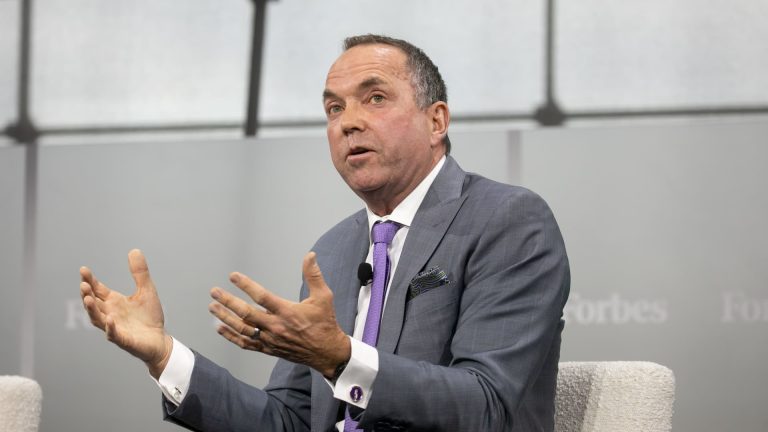Douglas Ingram, president and chief executive officer of Sarepta Therapeutics Inc., during the Forbes Healthcare Summit in New York, US, on Tuesday, Dec. 5, 2023.
Michael Nagle | Bloomberg | Getty Images
Shares of Sarepta Therapeutics plunged more than 30% on Friday as the future of its approved gene therapy treatment appeared at risk.
The Food and Drug Administration will request that the company voluntarily stop all shipments of the treatment, Elevidys, a person familiar with the matter told CNBC.
Sarepta told CNBC it had not heard from the FDA.
Separately, FDA Commissioner Marty Makary said in an interview with Bloomberg News that the agency is considering whether the company’s gene therapy should stay on the market.
The FDA has been investigating two patient deaths tied to Elevidys, which accounts for more than half of Sarepta’s total net product revenue. The company also reported a third death tied to a separate experimental gene therapy.
Elevidys has been mired in controversy even since before it was approved. The gene therapy has yet to clearly prove it can benefit people with Duchenne muscular dystrophy, a condition that erodes muscle function over time.
People with the disease eventually lose the ability to walk, and most die by their early 20s, meaning there’s a huge unmet need for treatment. The FDA in 2023 originally granted Elevidys a conditional approval for patients only between the ages of 4 and 5, the group that saw the most benefit in clinical trials.
The following year, the agency granted the treatment full approval for patients 4 and older who could still walk and accelerated approval for patients 4 and up who could no longer walk. The latter decision was especially contentious because there was less evidence that Elevidys could help people whose disease had already progressed so much.
Plus, Elevidys failed to meet its goal in a Phase 3 trial, though the company contended that the drug showed promise on other metrics in the study. Then head of the FDA’s Center for Biologics Evaluation and Research, Peter Marks, agreed with Sarepta’s assessment and overruled FDA staff to expand approval of Elevidys.
Earlier this year, Sarepta disclosed that two teenage boys died from liver failure after receiving Elevidys. Then this week, reports emerged that another person died during a Phase 1 trial investigating another one of Sarepta’s gene therapies for a different disease.
The two therapies are different, though they share the same method of delivery, heightening the safety concerns around Elevidys. The safety risks of Elevidys are especially important given the uncertain benefit, said BMO analyst Kostas Biliouris.
For example, Novartis’ gene therapy Zolgensma for spinal muscular atrophy has also caused liver toxicity and death, but the benefit of that treatment is clear.
“That’s why deaths here matter so much versus Zolgensma, for example,” Biliouris said.
And Zolgensma is just one drug of many for a large company like Novartis. For Sarepta, Elevidys is everything.
Executives this week tried to reassure investors that even if it can only treat patients who can still walk, where deaths haven’t been reported, the therapy should bring in at least $500 million a year. Sarepta last month stopped shipping Elevidys to patients who can no longer walk while it explores a safer way to administer the treatment.
The top concern for investors at this point is whether the FDA pulls the drug, Biliouris said. The company’s stock has now fallen more than 87% this year.
“If the FDA pulls Elevidys from the market,” he says, “Sarepta is done.”
Jennifer Handt, whose son was diagnosed with Duchenne muscular dystrophy in late 2020, said it was “heartbreaking” that other patients won’t have a treatment option to turn to if shipments of Elevidys are paused.
Her son, Charlie, was dosed with Elevidys in 2022 as part of Sarepta’s late-stage trial and noticed improvements in six to 12 months, including increased stamina and more fluid motions. The drug also eased a telltale symptom of the condition called Gowers’ sign, which causes children difficulty when getting up from a sitting or lying position.
She said her son is “completely stable” three years out from his dose. Handt said she was aware of the liver toxicity risks before Charlie enrolled in the trial.
“We don’t have the luxury of not taking the risk,” Handt said. “There are families that dealt with this disease before that would have done anything to have an option, even if there are risks.”
“Every family should have the choice to take this leap with this drug and potentially see benefits,” she added.

